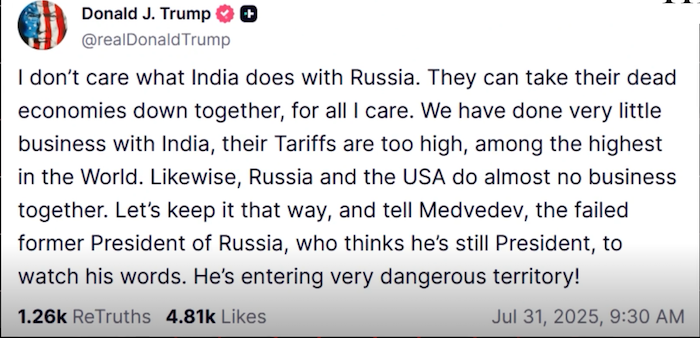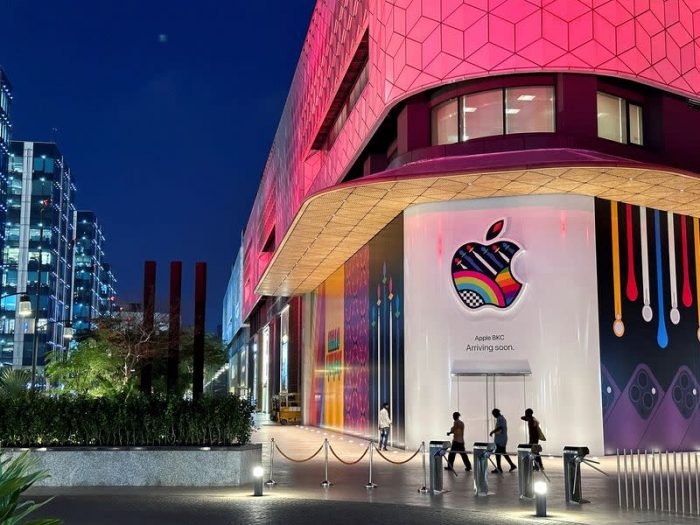US multinationals in India are facing a possible boycott of their goods and services because of public anger at President Donald Trump’s economic bullying to get a better tariff deal.
Trump’s damning attack on the country’s “dead economy” has stoked anti-American sentiment and companies ranging from McDonald’s to Coca-Cola, Amazon and Apple could suffer as a result.
India, the world’s most populous nation, is a key market for American brands that have rapidly expanded to target a growing base of affluent consumers, many of whom remain infatuated with international labels seen as symbols of moving up in life.
ALSO SEE: China’s Workers Hit by Tariffs as Factories Cut Hours, Pay
India, for example, is the biggest market by users for Meta’s WhatsApp and Domino’s has more restaurants than any other brand in the country. Beverages like Pepsi and Coca-Cola often dominate store shelves, and people still queue up when a new Apple store opens or a Starbucks cafe doles out discounts.
Although there was no immediate indication of sales being hit, there’s a growing chorus both on social media and offline to buy local and ditch American products after Donald Trump imposed a 50% tariff on goods from India, rattling exporters and damaging ties between New Delhi and Washington.

McDonald’s, Coca-Cola, Amazon and Apple did not immediately respond to Reuters’ queries.
Manish Chowdhary, co-founder of India’s Wow Skin Science, took to LinkedIn with a video message urging support for farmers and startups to make “Made in India” a “global obsession,” and to learn from South Korea whose food and beauty products are famous worldwide.
“We have lined up for products from thousands of miles away. We have proudly spent on brands that we don’t own, while our own makers fight for attention in their own country,” he said.
Rahm Shastry, CEO of India’s DriveU, which provides a car driver on call service, wrote on LinkedIn: “India should have its own home-grown Twitter/Google/YouTube/WhatsApp/FB – like China has.”
To be fair, Indian retail companies give foreign brands like Starbucks stiff competition in the domestic market, but going global has been a challenge.
Indian IT services firms, however, have become deeply entrenched in the global economy, with the likes of TCS and Infosys providing software solutions to clients the world over.
On Sunday, Modi made a “special appeal” for becoming self-reliant, telling a gathering in Bengaluru that Indian technology companies made products for the world but “now is the time for us to give more priority to India’s needs.”
He did not name any company.
BJP supporters seek national response
Even as anti-American protests simmer, Tesla launched its second showroom in India in New Delhi, with Monday’s opening attended by Indian commerce ministry officials and US embassy officials.
The Swadeshi Jagran Manch group, which is linked to Modi’s Bharatiya Janata Party, took out small public rallies across India on Sunday, urging people to boycott American brands.
“People are now looking at Indian products. It will take some time to fructify,” Ashwani Mahajan, the group’s co-convenor, told Reuters. “This is a call for nationalism, patriotism.”
He also shared with Reuters a table his group is circulating on WhatsApp, listing Indian brands of bath soaps, toothpaste and cold drinks that people could choose over foreign ones.
On social media, one of the group’s campaigns is a graphic titled “Boycott foreign food chains”, with logos of McDonald’s and many other restaurant brands.
In Uttar Pradesh, Rajat Gupta, 37, who was dining at a McDonald’s in Lucknow on Monday, said he wasn’t concerned about the tariff protests and simply enjoyed the 49-rupee ($0.55) coffee he considered good value for money.
“Tariffs are a matter of diplomacy and my McPuff, coffee should not be dragged into it,” he said.
- Reuters with additional editing by Jim Pollard
ALSO SEE:
Trump Ramps Criticism of India: ‘Backing ‘Russian War Machine’
Dozens of Countries Hit With Steep US Tariffs, But Some Feel Relief
India’s Modi Shows His Preference: a Free-Trade Pact With Britain
S Korea to Invest $450bn in US Projects, Energy; Gets 15% Tariff
Trump Says India Will Face 25% Tariff, Penalty From August 1
India Now the Biggest Source of Smartphone Exports to the US
Trump’s Dealings With Pakistan Has India Slowing Tariff Talks
Nikkei Jumps After Trump Strikes 15% Tariff Deal With Japan
China Firms Race Out Exports to Beat Trump’s Big Tariff Deadline
Vietnam to Ramp up Inspection of Chinese Goods After Trump Deal























